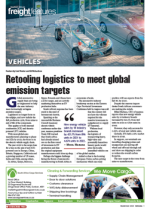Global automotive supply lines are being re-engineered to help the auto industry meet increasingly stringent emission targets.Legislators no longer focus on the tailpipe, and now include the full production cycle, from mine to end of life of the component.This applies to both internal combustion (ICE) and electric-powered (EV) vehicles.With most global auto manufacturers planning to phase out ICEs by 2035, the focus is on the electric vehicle supply chain.The year 2035 is the target date for a ban on the sale of new ICE-powered cars in Europe, China, Britain, Singapore, California and a growing number of US states, India and Chile, among others.In Africa, Kenya, Morocco, Egypt, Rwanda and Ghana have a 2040 target, and are actively marketing themselves as EV production hubs.South Africa’s response has been stuck in the mud of bureaucratic inertia.Speaking at the Automobile Business Council (naamsa) electric vehicle conference earlier this year, naamsa president Neale Hill warned that South Africa had already missed out on the first round of investment in EV production and that the original equipment manufacturers could close up shop.Perhaps the biggest challenge facing the future of automotive manufacturing in South Africa is economies of scale.The automotive industry breakaway session at the Eastern Cape Provincial Investment Conference held in August was told that the country did not have the volumes required for the massive investment in a gigafactory to supply EV batteries.Without local production, the logistics of transporting heavy, high-value and potentially hazardous battery packs would price the locally assembled vehicles out of the global market.Added to that is the looming European Union carbon pricing mechanism which one study predicts will see exports from SA fall 4% by 2030.Despite the onerous import duties South African consumers are making the switch.Mikel Mabasa, CEO of naamsa reports that new energy vehicle sales by 18 industry brands increased by 421.7% from 896 units in 2021 to 4.674 units in 2022.However, they only account for 0.88% of total new vehicle sales.Globally, EVs held a 14% market share in 2022.In support, car terminals are installing charging points and transporters are moving off-wheel and off-road through rail and short sea shipping in order to reduce the overall carbon footprint.The next target is the route from mine to manufacturer.

